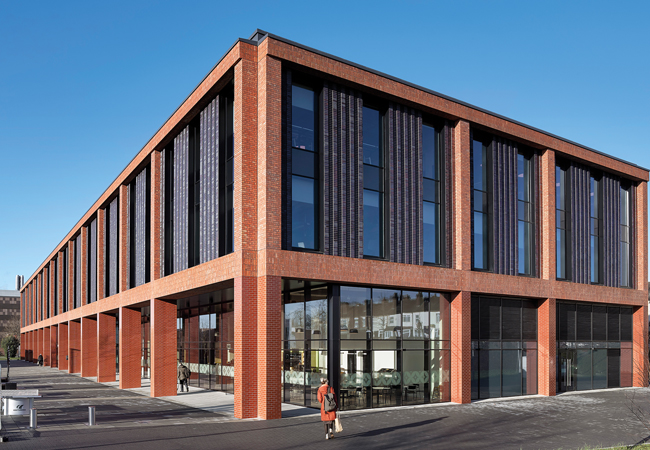
The Catalyst building – Max Fordham, Project of the Year
There was a record number of entries for the 2024 CIBSE Building Performance Awards – with the expert panel of judges, led by chair Hywel Davies, rigorously evaluating projects across 18 categories, each representing a vital aspect of the built environment and emphasising an evolving commitment to holistic performance.
Project of the Year was divided into six awards, and showcased a diverse range of entries. There was an emerging theme of prioritising wellness within buildings, plus a heightened awareness of climate change impacts. Judges observed a commendable understanding of the challenges faced by the sector, saying that projects are ‘extending their focus beyond just the energy performance, to a space where building performance becomes far more holistic’. In particular, Project of the Year – Retrofit drew attention for its emphasis on embodied carbon conservation, highlighting the crucial need to retrofit older buildings to meet net zero targets.
The judges were impressed by how these standout projects exemplified effective solutions, showcasing a positive shift towards sustainable building practices. Similarly, in the Project of the Year – Commercial and Offices, the judges saw an impressive amount of innovation and creative thinking.
A new category, Project of the Year – Leisure, was introduced, acknowledging a number of exceptional projects that delivered on their buildings for leisure through a spectrum of servicing methods – from passive to highly complex and efficient systems – with the building’s purpose being a priority.
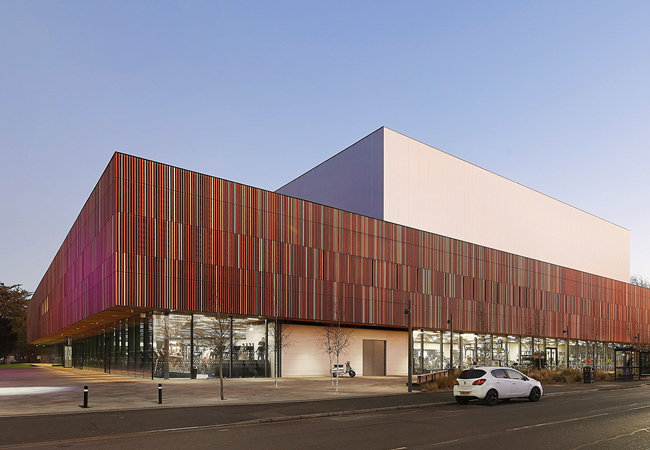
Ravelin Sports Centre – Max Fordham, Project of the Year - Leisure
The Best Digital Innovation Award, introduced last year, proved highly competitive, with more than 20 entries of ‘exceptional quality’. Judges noted a prevalent theme of decarbonisation and a significant shift towards incorporating machine learning into real-world applications.
The inclusion of robust data across various categories, including Best Digital Innovation, was praised, emphasising the importance of tangible performance metrics as a key way of visualising performance. However, judges for the Project of the Year – Residential category expressed a desire for more data-centric schemes, signalling a potential focus area for future innovations in the industry.
Facilities Management (FM) emerged as a standout category this year, with a robust field of entries. The judges commended the ‘positive impact FM can have when it takes an active role in engaging with building users, especially in the context of decarbonisation and energy management’. Collaboration and knowledge sharing across the entire value chain were highlighted as promising trends.
The Building Performance Consultancy award was divided into categories based on employee count, to recognise outstanding practices that excel in collaboration, innovative protocols, and inclusivity.
We are seeing companies that are really focusing on the humans who actually work for them – it’s great
In the category for firms with up to 50 employees, the judges saw some ‘stunning entries’ from consultancies engaging in best practice, knowledge sharing and wellbeing. ‘We’re seeing companies that are really focusing on the humans who actually work for them – it’s great,’ the judges remarked.
The 51-300 employees category highlighted the importance of inclusivity, but called for more innovation. The 300+ employee category demonstrated significant improvements from the previous year, showcasing a clear commitment to addressing the climate challenge through extensive knowledge-sharing initiatives and upskilling programmes. Training and development of young staff was key for many of the firms shortlisted.
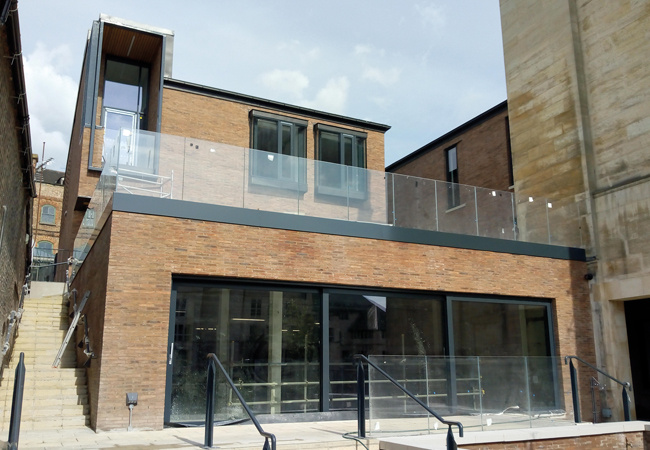
York Guildhall – SGA consulting, Project of the Year - Public Use
The CIBSE President’s theme of engineering leadership was evident in the Engineer of the Year category. Judges noted a clear ability among contenders to embrace knowledge sharing and a genuine willingness to develop others. They were also pleased to note the diversity of candidates from across building services, with the pandemic cited as improving our ability to communicate with anyone, wherever they may be in the world.
Similarly, the Learning and Development category showcased strong entries that focused on the dissemination of knowledge throughout the industry, with an emphasis on areas that have the most impact on building performance. Peer-to-peer learning was highlighted as an important mechanism for transferring specialist knowledge to others.
The Collaboration Award demonstrated the industry’s recognition of the critical role collaboration plays in achieving optimal outcomes, with a noticeable trend towards using data analytics for enhanced decision-making. The entries demonstrated the ‘art of the possible, and where we all need to get to’, said the judges.
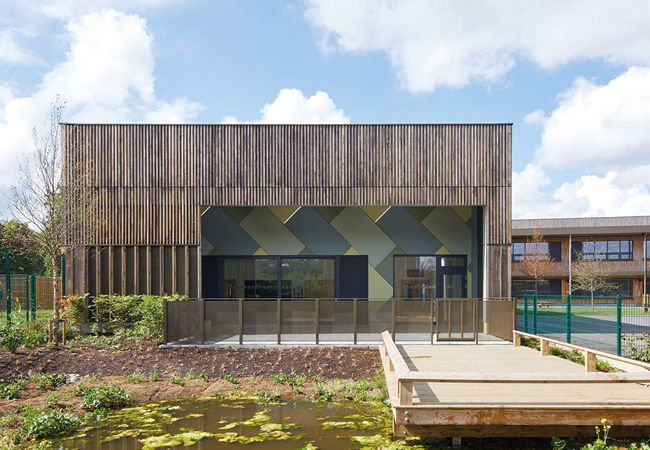
Hackbridge Primary School – Introba/Architype, Project of the Year - Leisure
Embodied carbon was another key theme throughout the categories. The Embodied Carbon Award highlighted the industry’s commitment to reducing embodied and operational carbon, with a growing awareness of end-of-life emissions. The judges were impressed by the sector’s dedication to practicing circular economy principles.
A commitment to meeting net zero goals was showcased in entries for Product or Innovation of the Year, which was divided into air quality, thermal comfort and wellbeing categories. A wide range of products was seen in the air quality section, including for refrigeration, water heating and ventilation. Entries showed an understanding of the need for flexibility of application, as well as maintaining regulatory standards. ‘The range of innovations demonstrates that the innovation doesn’t need to be epic to be influential and beneficial,’ the judges said.
The Judges
- Claire Aizlewood, head of sustainability, CIBSE
- Jan Artemenko, senior associate, Stantec
- Jon Belfield, managing director, InTandem Systems
- Emma Bushell, energy and carbon manager, City of London Corporation
- Maria Benazzo, mechanical engineer, Arup
- Carl Collins, Head of Digital Engineering, CIBSE
- Darren Coppins, director, Built Physics
- Hywel Davies, chief technical director, CIBSE
- Kathryn Donald, digital design and building performance modelling director, Max Fordham
- Sally Godber, director, Peter Warm
- Julie Godefroy, head of net zero policy, CIBSE
- Rob Griffiths, AtkinsRéalis
- Joanna Harris, UK&I hard FM ambassador, Sodexo
- Jeff House, external affairs and policy director, Baxi
- Aidan Kelly, senior mechanical engineer, digital lead, CIBSE heat networks consultant, XCO2
- Laura Mansel-Thomas, senior partner, Ingleton Wood
- Anastasia Mylona, technical director, CIBSE
- Ted Pilbeam, building services and sustainability director, Volker Fitzpatrick
- Michael Powers, director, Clancy Consulting
- Rob Redfern, group energy manager (renewables & LZC), Tesco
- Craig Robertson, head of sustainability, Allford Hall Monaghan Morris Architects
- Peter Thorns, head of strategic lighting applications, Thorn lighting
- Fabrizio Varriale, place and space analyst, RICS
- Jon Saltmarsh, Chief Technology Officer, Energy Systems Catapult
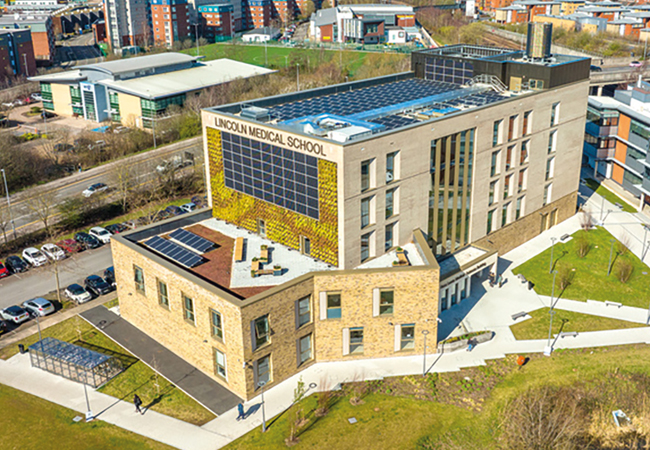
Ross Lucas Medical Sciences Building, University of Lincoln – BAM Design & Yonder, Project of the Year - Leisure
The winners will be announced at the awards ceremony at Park Plaza Westminster Bridge, London, on 29 February 2024. To book a table, visit www.cibse.org/bpa
